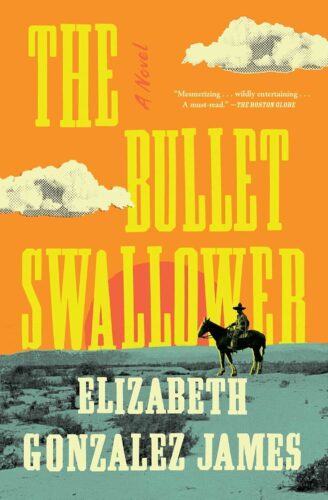 The Wages of Sin
The Wages of Sin
Author: Elizabeth Gonzalez James
Lamentations 5:7: Our fathers sinned, and are no more; It is we who have borne their iniquities.
The history of the Sonoro’s starts with a man who has gold in his eyes and hate in his heart. His atrocities have cleaved lands asunder, have left the innocent to die deep in the earth, have become the stuff of legends. It’s 1895, and this man’s latest descendent, Antonio, is leaving the peace of his farm to follow the family line. Antonio is a bandit, and he will rob a train to save his family from poverty. Or so he thinks. When things go wrong, however, and he watches his brother’s blood brighten the dust, his heart turns to revenge. New evil is born out of old evil, and a strange figure watches from the wings, wondering if it did the right thing to thwart the rules and let the infant who became the man live. How much do the father’s sins trickle into the next generation, and who will pay this mounting debt?
Switch to 1964. The latest descendant in the Sonoro line, an amiable actor, has found an ancient book that tells the story of his family. As he continues to read, he becomes aware of the debt of iniquity hanging over them all. When a strange figure shows up at their house, the actor suspects it’s time to pay-up. Now, he must finish the journal to find out: what debt of collective sin is left owing and what will happen to him and his family? Are they responsible for the family’s checkered past? Are they any better than the bandits and killers who gave them life?
Oscillating between these two timelines, we watch the figure of death ponder. Part of this is a game. Death defied the rules. Why kill an innocent infant for the sins of the father? But that decision has had a domino effect, and while Death is interested in the results of the experiment, he is also afraid of the repercussions. Is there any redemption for the Sonoro’s, or should he have followed instructions so long ago and visited the sins of the father’s immediately on the sons?

Image by u_0xqcqp9f6q from Pixabay
While magical realism plays a structural role in setting the premise of the tale, most of it stays within the bounds of the real world, examining the idea of sin, of repentance, of the nobleness and evil of humanity and how intertwined they are in our corrupted state. Antonio, with his train robbing scheme and penchant for outlaw justice, is the most interesting, and, I would argue, central figure. Antonio has some sense of honor, but more than that he has a violent hypocrisy. Do unto others is not a concept for him, and his quest for easy money becomes one of vengeance that leads him through some fascinating scenarios. He is a truly grey character, and while we like and empathize with him, his flaws are undeniable and visceral. He is a true character, a not-quite villain born of complexity and contradictions. His journey is harsh and exciting, symbolic and earthy. Through it, he talks about the state of humanity, the unfairness of people, racism and bigotry, class differences and the insidious nature of colonialism, and above all, the lying nature of the heart and mind.
The 1964 timeline is less interesting. Jamie (the actor) is a poor substitute, an everyman with a failing career and the usual, generic fears and worries. His father isn’t as proud of him as he would like, his family is quarrelsome, etc. He is the catalyst to read the story in the book, but honestly, we could do without Jamie. His story, and Death’s strange little visit to his home, weakens an otherwise strong tale. We’re in it for Antonio, the legendary bullet swallower who defied death in his quest.
The Bullet Swallower is at turns dramatic and thoughtful, full of empathy for its flawed characters. The violence highlights how human justice often falls short, and how vengeance transforms into hatred. It is a story with a heart, one that ultimately observes consequences and, dare we say it, the destructive, infectious nature of sin. We put down the book having gone on a dark adventure. The last page slides into place, leaving us thinking about the debts we accrue throughout life and how they compile, how humanity has run up a tab of transgressions that we, collectively and individually, cannot pay.
– Frances Carden
Follow my reviews on Twitter at: https://twitter.com/xombie_mistress
Follow my reviews on Facebook at: https://www.facebook.com/FrancesReviews
- Book Vs Movie: The Shining - April 6, 2020
- Thankful For Great Cozy Mysteries - December 13, 2019
- Cozy Mysteries for a Perfect Fall - October 20, 2019


